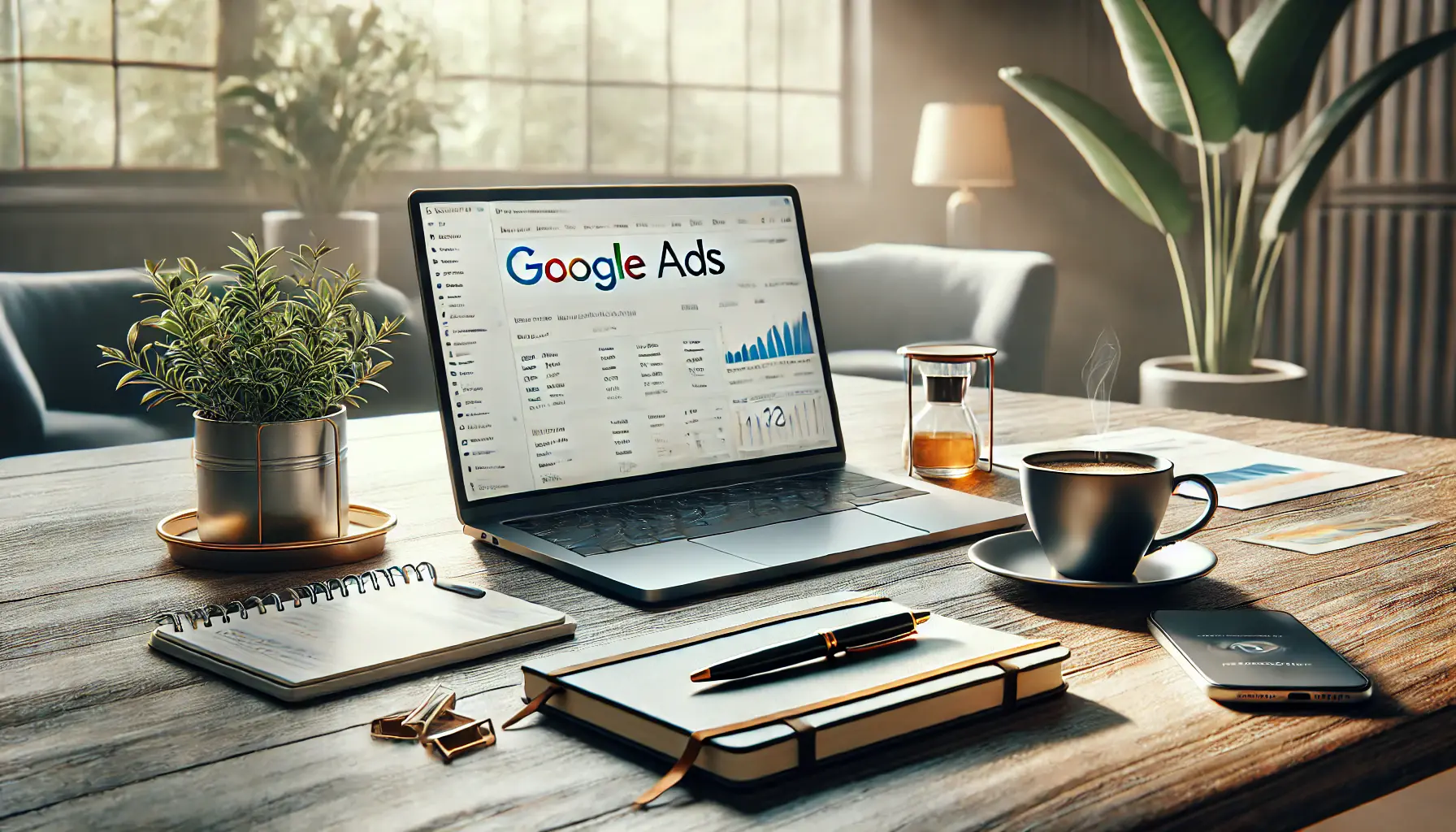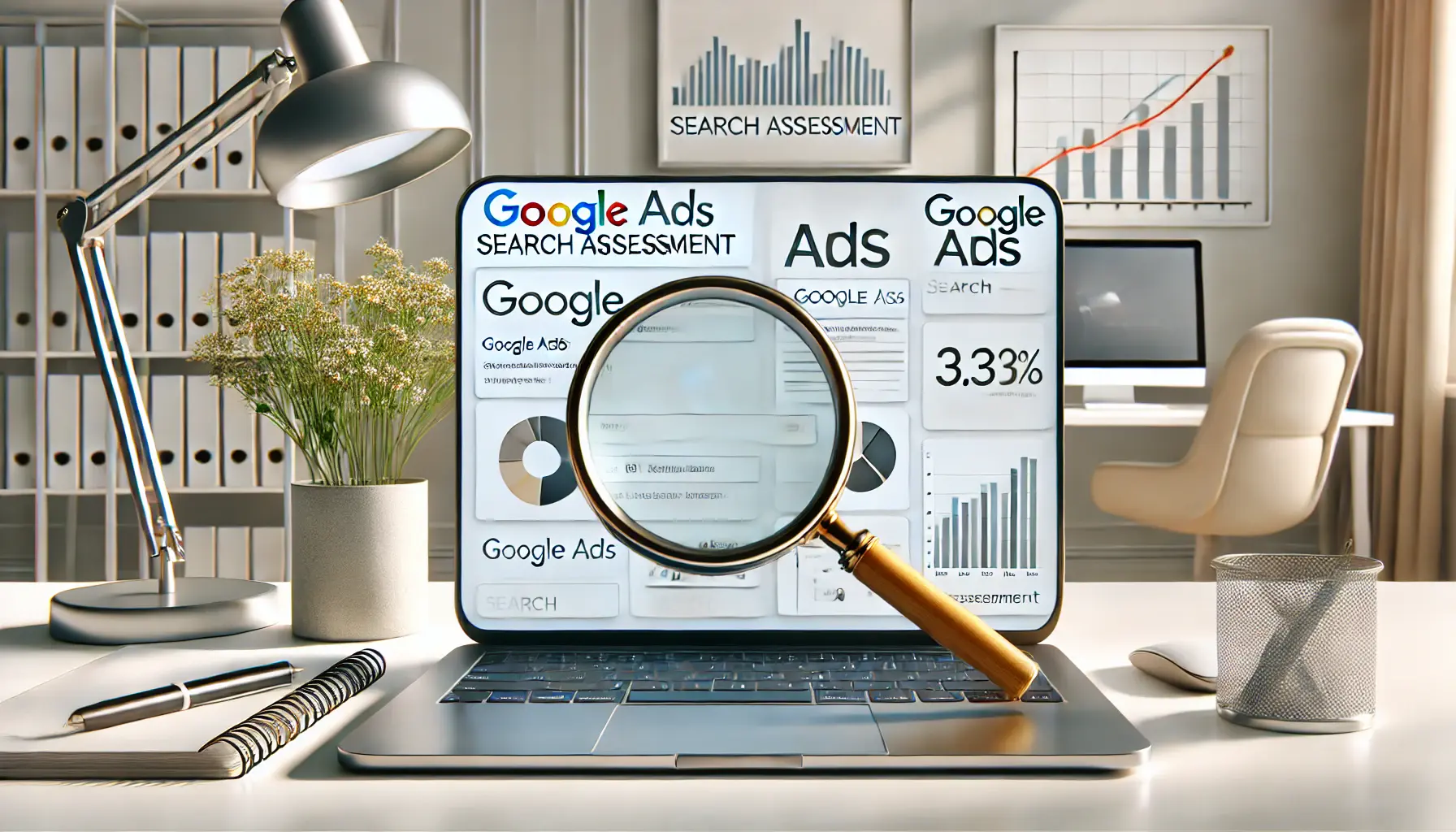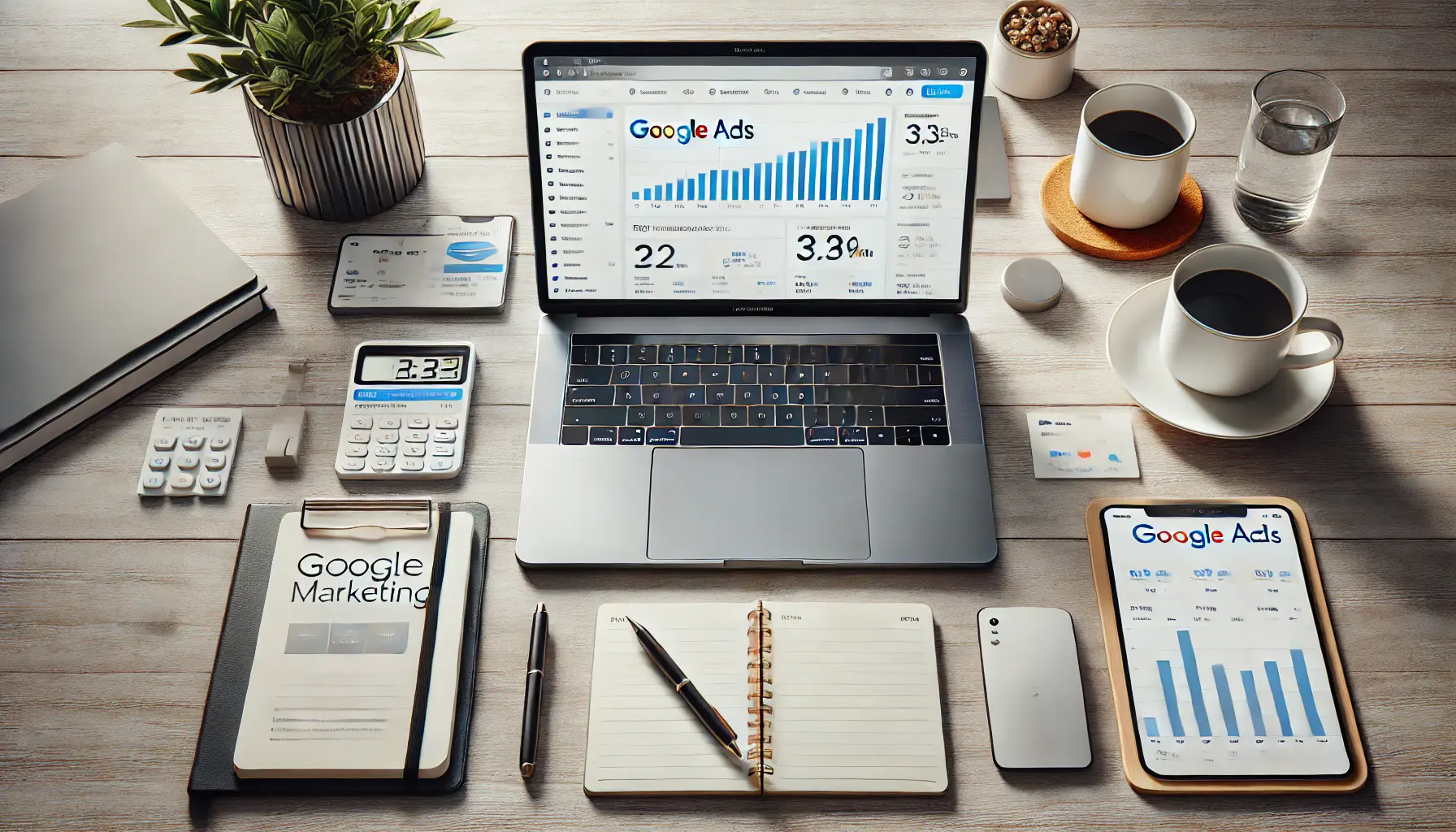Are Google Ads worth investing in?
With businesses of all sizes looking to digital platforms to reach their audiences, whether Google Ads provide a strong return on investment has become the million-dollar question.
In this article, we’ll dive deep into the intricacies of assessing Google Ads ROIReturn on Investment, a measure of profitability in advertising., uncovering the benefits, challenges, and strategies to help you make informed decisions about your advertising budget.
Understanding Google Ads ROI
When it comes to advertising, ROI is the ultimate measure of success.
It answers a crucial question: Are you getting more value from your Google Ads campaigns than what you’re spending on them?
Understanding how ROI works is the first step in evaluating whether Google Ads are worth your investment.

A workspace showcasing data visualization tools for understanding ROI in advertising.
Defining Return on Investment in Advertising
Return on Investment (ROI) in advertising refers to the financial return a business gains from its marketing campaigns relative to the amount spent.
For Google Ads, this often means comparing the revenue generated from ad-driven sales to the total cost of running the ads, including bid amounts, ad creative costs, and management fees.
- Formula for ROI: ROI = (Revenue from Ads – Cost of Ads) / Cost of Ads
- Key Consideration: A positive ROI indicates your campaign is profitable, while a negative ROI suggests adjustments are needed.

A workspace emphasizing the role of ROI metrics in digital marketing strategy and performance analysis.
Importance of ROI in Digital Marketing
In the fast-paced world of digital marketing, ROI serves as a performance benchmark.
Knowing your ROI helps you allocate budgets wisely, optimize underperforming campaigns, and understand customer acquisition costs.
Without ROI analysis, you risk overspending on ads that don’t generate meaningful results.
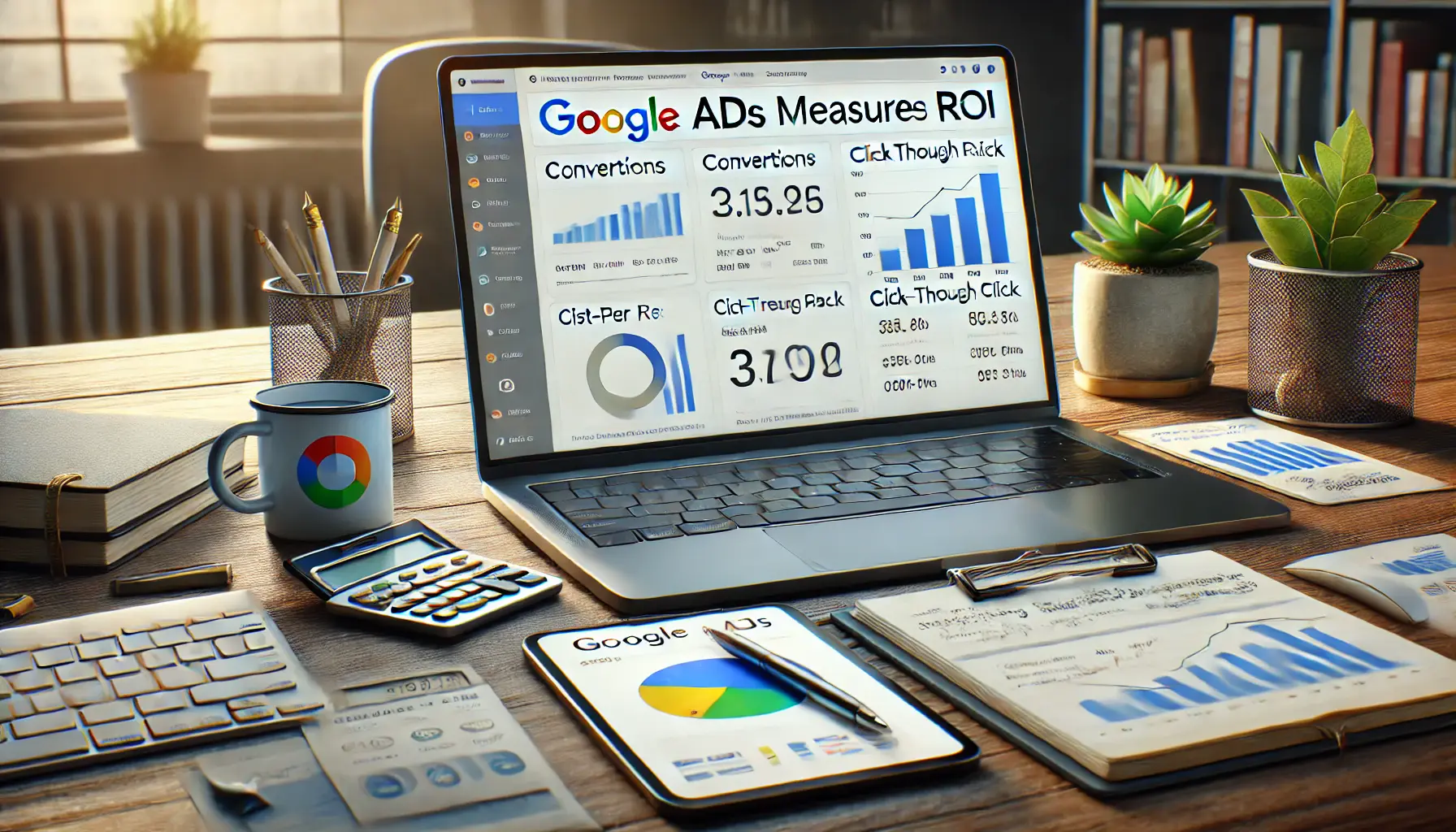
An analytical setup demonstrating how Google Ads tracks and measures ROI through key metrics.
How Google Ads Measures ROI
Google Ads provides robust tools to help advertisers track ROI.
Through detailed metrics such as conversions, cost-per-click (CPCCost-Per-Click, the amount paid for each click on an ad.), and click-through rates (CTRClick-Through Rate, the percentage of impressions that result in clicks.), businesses can evaluate the effectiveness of their campaigns.
Additionally, features like conversion tracking and Google AnalyticsA web analytics service by Google to track and report website traffic. integration offer deeper insights into how ads contribute to overall revenue.
- Conversion Tracking: Tracks actions such as purchases or sign-ups to measure ad impact.
- Google Analytics: Helps identify traffic sources and evaluate campaign performance in detail.
- Cost Metrics: Analyze CPC and cost-per-acquisition to fine-tune budgets.
Understanding these aspects will answer the big question: Are Google Ads worth it for your business?
With the right metrics in place, you can assess performance, find opportunities, and maximize your return.
Understanding ROI helps assess whether your Google Ads campaigns are delivering profitable results, forming the foundation for strategic decisions.
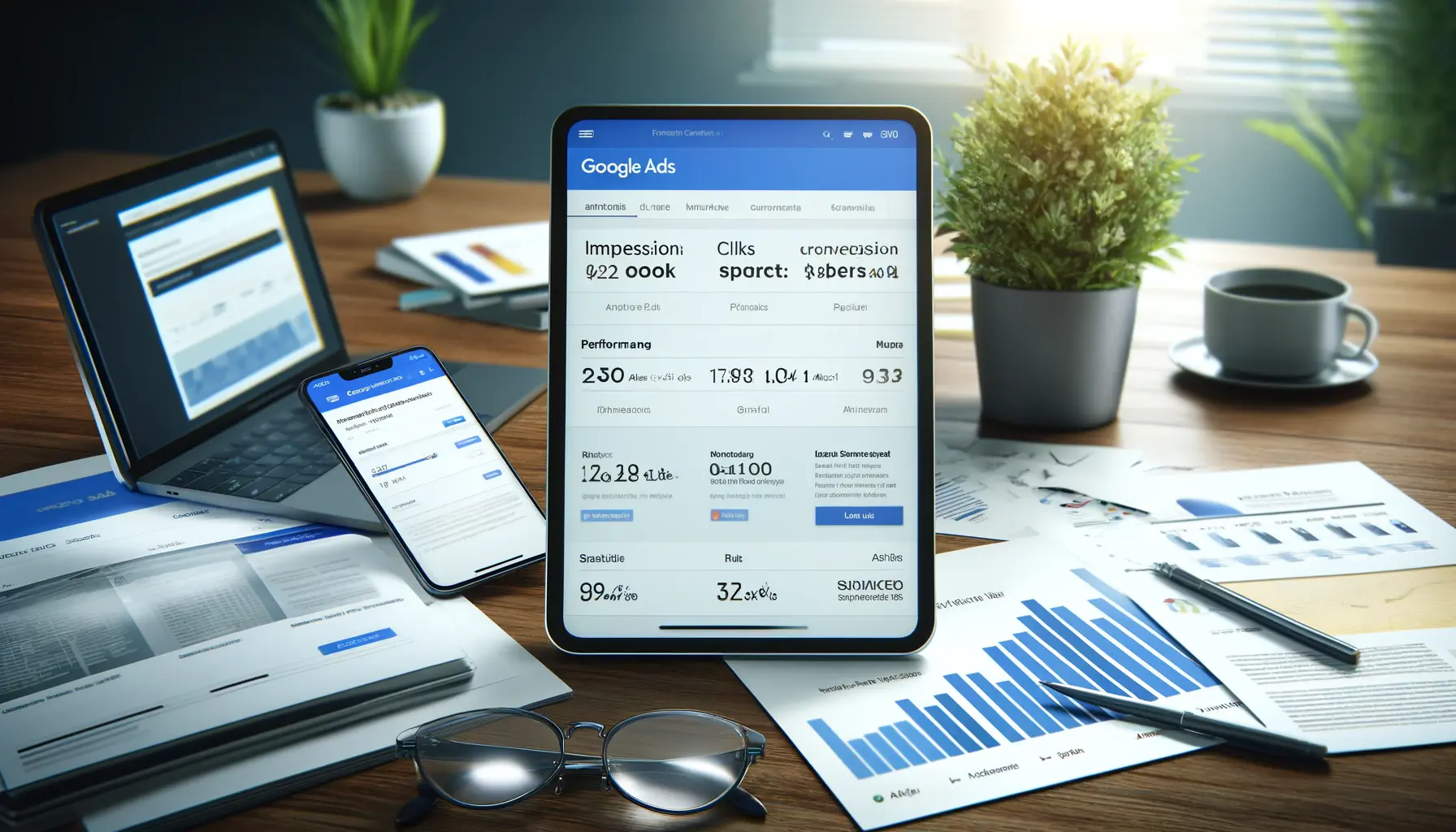
A detailed setup showcasing the advantages of Google Ads through performance tracking and targeted advertising.
Benefits of Investing in Google Ads
Investing in Google Ads offers several advantages that can significantly enhance the online presence and profitability of your business.
Here are some of the main benefits:
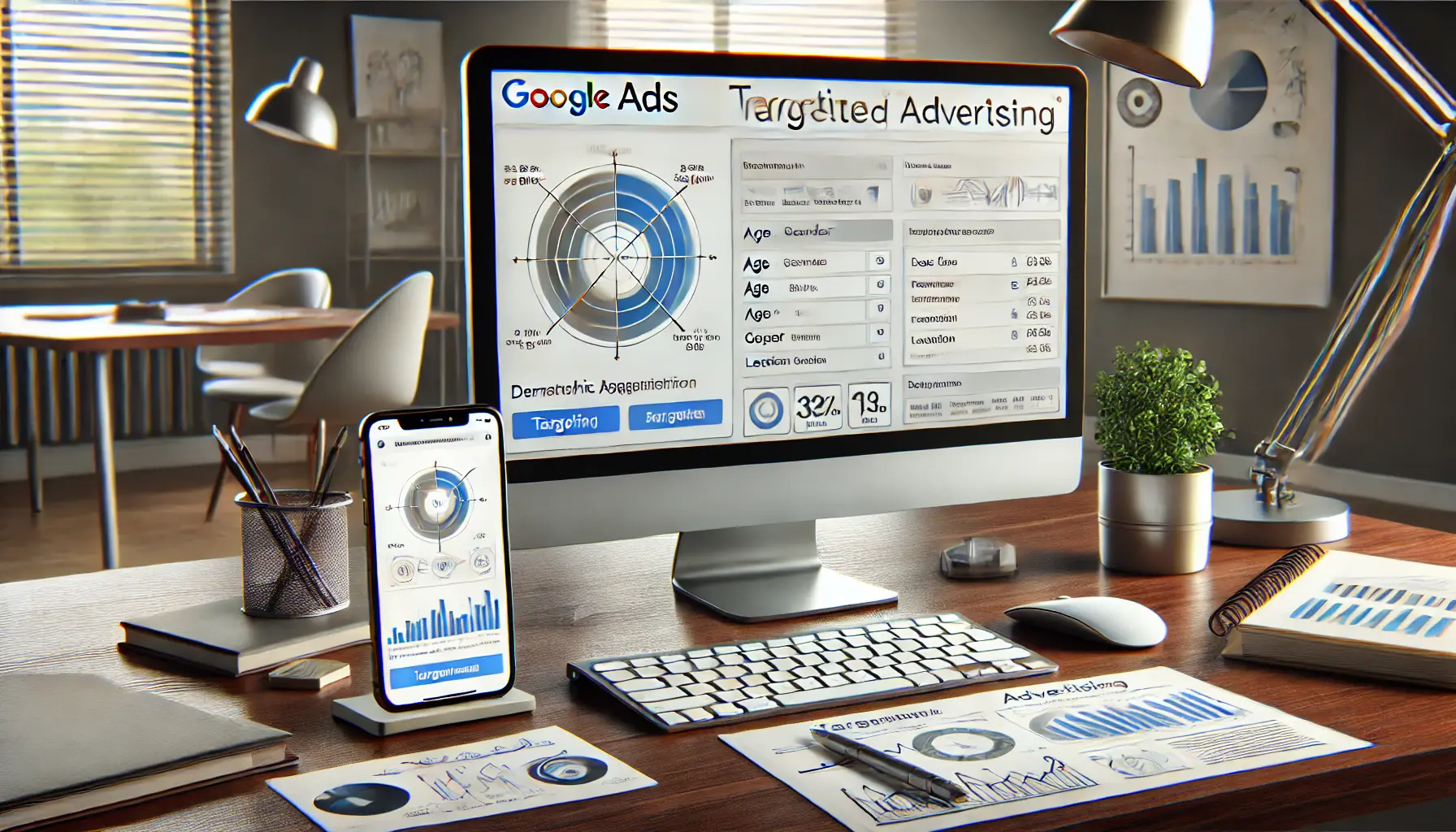
A detailed workspace showcasing the precision of targeted advertising through Google Ads settings.
Targeted Advertising Capabilities
Google Ads can be used to reach an extremely targeted audience using various advanced targeting options.
You can tailor your ads based on:
- Keywords: Select terms that potential customers are searching for, ensuring your ads appear at the right moment.
- Demographics: Target users based on age, gender, and parental status to align with your ideal customer profile.
- Location: Focus on geographic areas where your products or services are available, whether locally or globally.
- Interests and Behaviors: Reach audiences based on their online activities and preferences.
This precision ensures that your marketing efforts are directed toward individuals most likely to engage with your business, maximizing the effectiveness of your advertising spend.
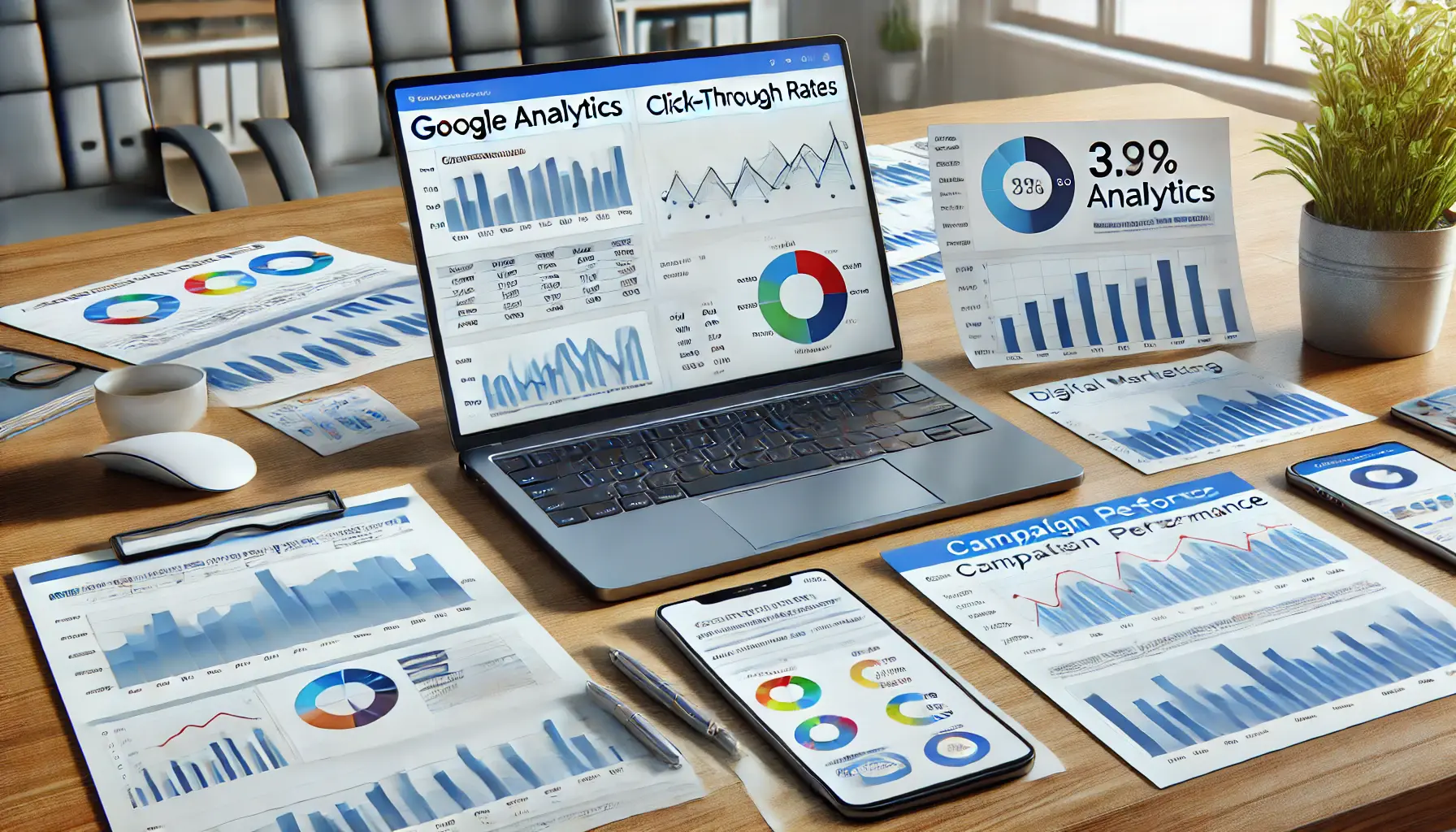
A modern workspace highlighting the role of measurable analytics in digital marketing success.
Measurable Results and Analytics
One of the standout advantages of Google Ads is the ability to track and measure the performance of your campaigns in real-time.
With detailed analytics, you can monitor:
- Impressions: The number of times your ad is displayed.
- Clicks: How many users clicked on your ad.
- Click-Through Rate (CTR): The percentage of impressions that resulted in clicks, indicating ad relevance.
- Conversions: Actions taken by users after clicking your ad, such as purchases or sign-ups.
- Cost Metrics: Insights into cost-per-click (CPC) and cost-per-acquisition (CPA), helping you assess ROI.
These metrics provide valuable insights into what’s working and what needs adjustment, enabling data-driven decisions to optimize your campaigns for better performance.
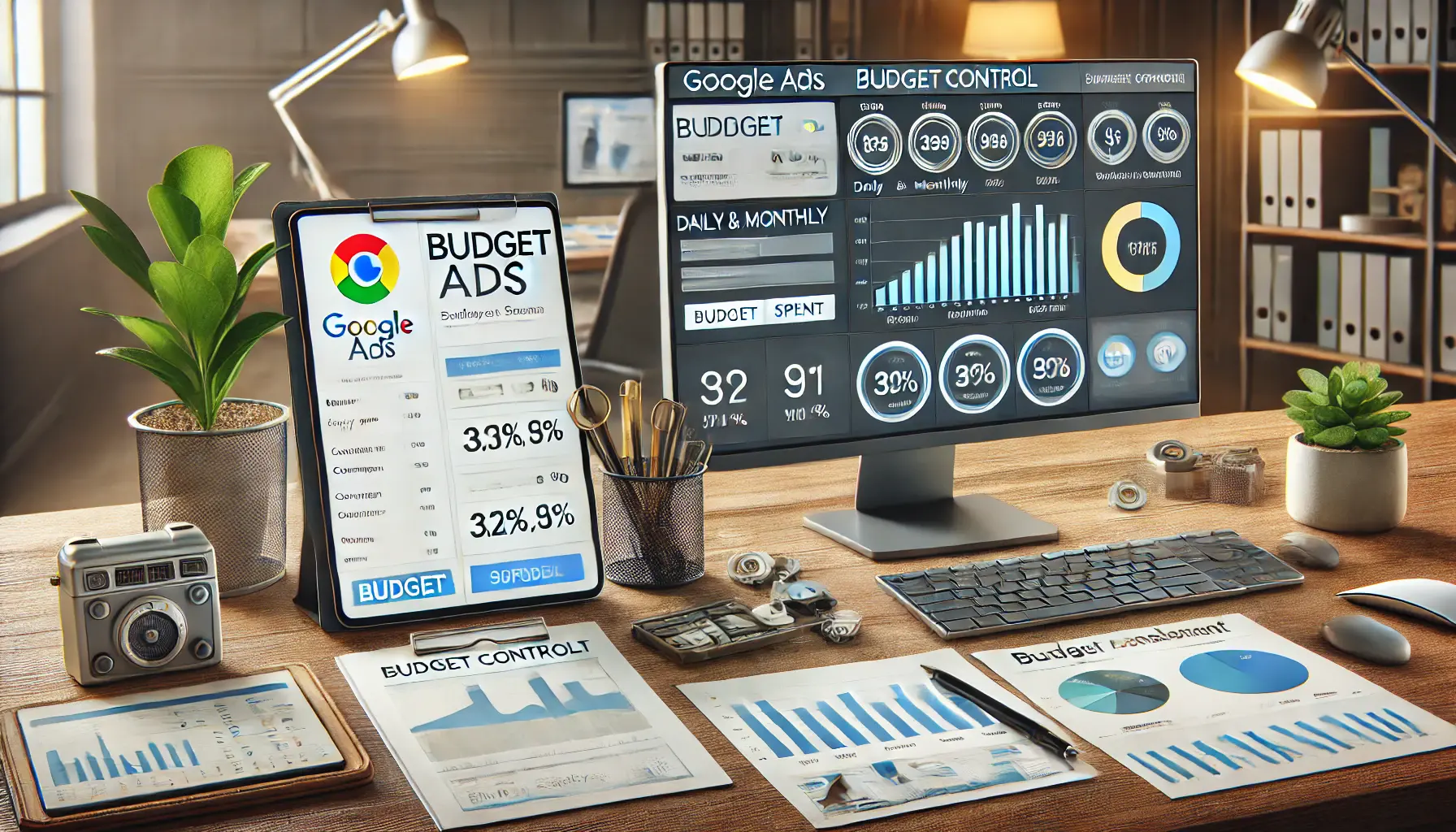
A modern workspace emphasizing the importance of scalability and budget control in advertising campaigns.
Scalability and Budget Control
Google Ads offers unparalleled flexibility in managing your advertising budget.
You have total control over the following:
- Daily and Monthly Spend: Set limitations to ensure you do not exceed your budget.
- Bidding Strategies: Decide how much you are willing to pay per click or per acquisition.
- Campaign Adjustments: Pause, modify, or scale up campaigns according to performance and business needs.
This scalability allows you to start with a limited budget and increase your investment as you see positive returns.
This makes Google Ads a viable option for companies of any size.
By leveraging these benefits, you can enhance your online visibility, attract qualified leads, and ultimately drive growth for your business.
So, are Google Ads worth the spend?
Given these advantages, they can undoubtedly be a powerful tool in your digital marketing arsenal.
- Google Ads offers precise audience targeting through keywords, demographics, location, and behaviors.
- Scalable budgets and measurable analytics empower businesses of any size to optimize advertising efforts effectively.
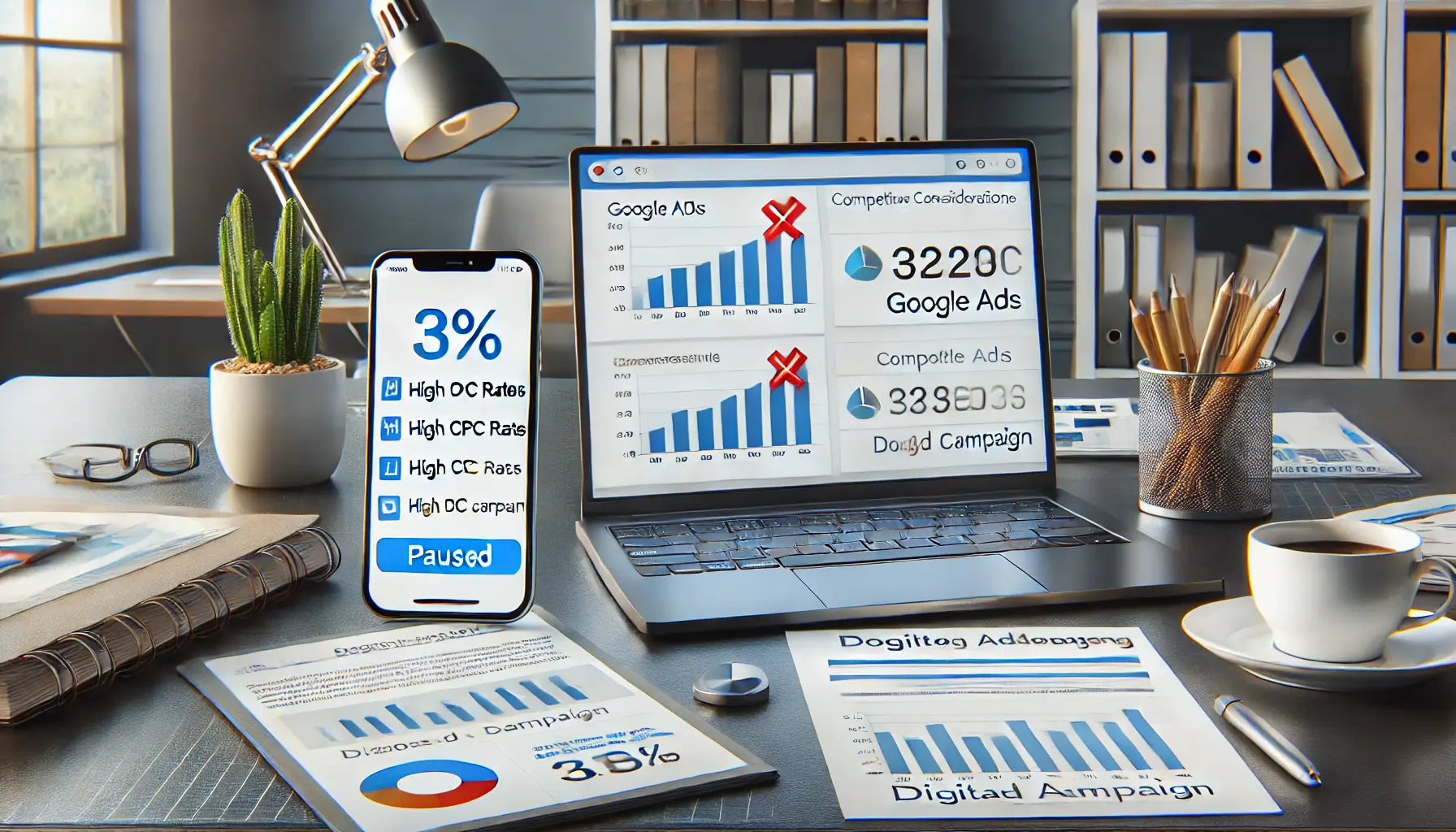
A depiction of common challenges in digital advertising, including rising costs and policy compliance issues.
Challenges and Considerations
While Google Ads offers a lot of benefits, there are challenges and considerations you must be aware of.
Understanding these will help you make informed decisions and optimize your advertising efforts effectively.
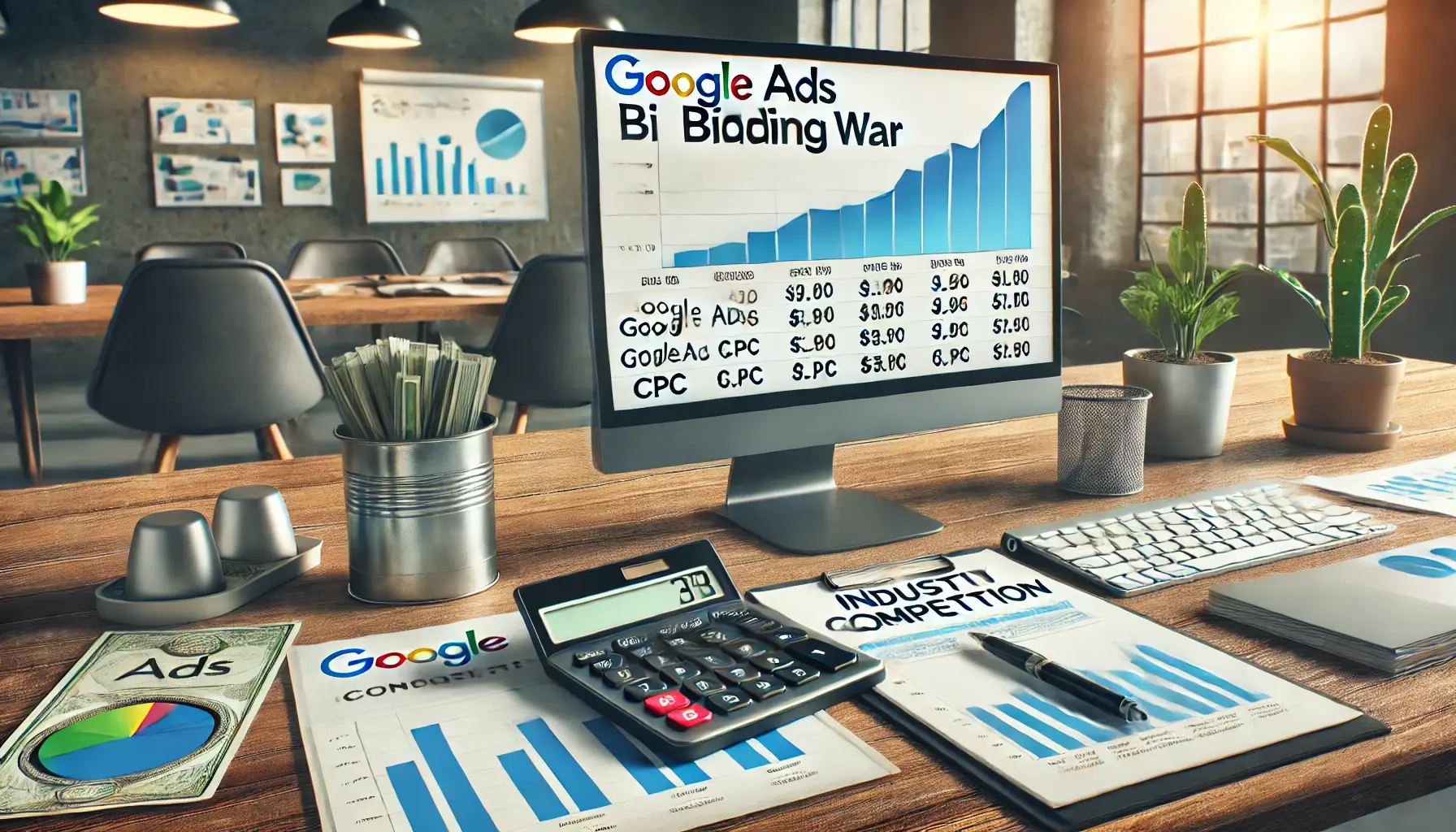
An illustration of the challenges posed by growing competition and rising costs in digital advertising.
Growing Competition and Rising Costs
As more businesses invest in Google Ads, the platform has grown increasingly competitive.
This growing competition can result in higher CPC rates, especially in saturated industries.
For instance, the legal services and insurance industries have a high CPC since many advertisers bid on the same keywords.
To manage these rising costs, it’s crucial to:
- Conduct Thorough Keyword Research: Identify less competitive, long-tail keywords that are relevant to your business.
- Optimize Ad Quality: Improve ad relevance and landing page experience to achieve higher Quality Scores, which can lower CPCs.
- Monitor and Adjust Bids: Regularly review and adjust your bidding strategy to ensure cost-effectiveness.

A depiction of the challenges of ad disapprovals and the importance of adhering to advertising policies.
Ad Disapprovals and Policy Compliance
Google maintains strict advertising policies, and non-compliance can result in ad disapprovals.
Common reasons for rejection include misleading content, inappropriate language, or violation of regulations within the given industry.
To minimize the risk of ad disapprovals:
- Familiarize Yourself with Google’s Policies: Regularly review Google’s advertising guidelines to ensure compliance.
- Maintain Transparency: Ensure your ad content accurately represents your offerings and avoids misleading claims.
- Monitor Ad Performance: Keep an eye on your ads’ status and promptly address any disapprovals.

A representation of the critical role of keyword strategies in digital advertising success.
Dependence on Effective Keyword Strategies
The success of your Google Ads campaigns heavily relies on effective keyword strategies.
Poor keyword selection can lead to irrelevant traffic and wasted ad spend.
To enhance your keyword strategy:
- Utilize Negative Keywords: Exclude terms that are not relevant to your business to prevent unwanted clicks.
- Analyze Search Terms Reports: Review the actual search queries triggering your ads to refine your keyword list.
- Continuously Optimize: Regularly update and expand your keyword list based on performance data and market trends.
By acknowledging and addressing these challenges, you can better navigate the complexities of Google Ads and enhance the effectiveness of your advertising campaigns.
Rising competition increases CPC rates, making cost management and strategic planning essential. Ad disapprovals and poor keyword strategies can further hinder performance.
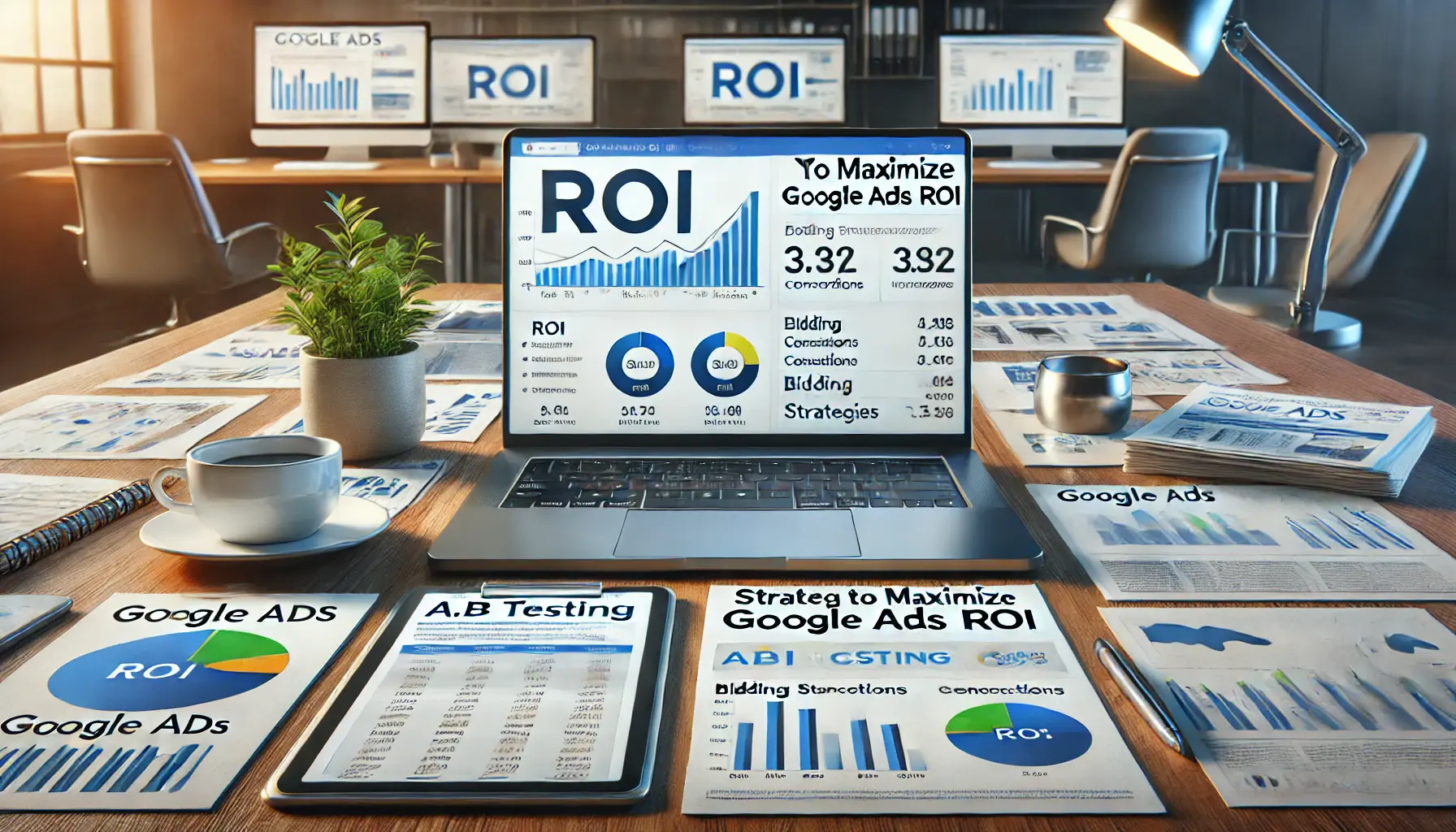
A depiction of strategic approaches to maximizing Google Ads ROI through performance analysis and optimization.
Strategies to Maximize Google Ads ROI
Enhancing the return on investment (ROI) of your Google Ads campaigns requires a strategic approach.
Implementing the following strategies can help you achieve better results:
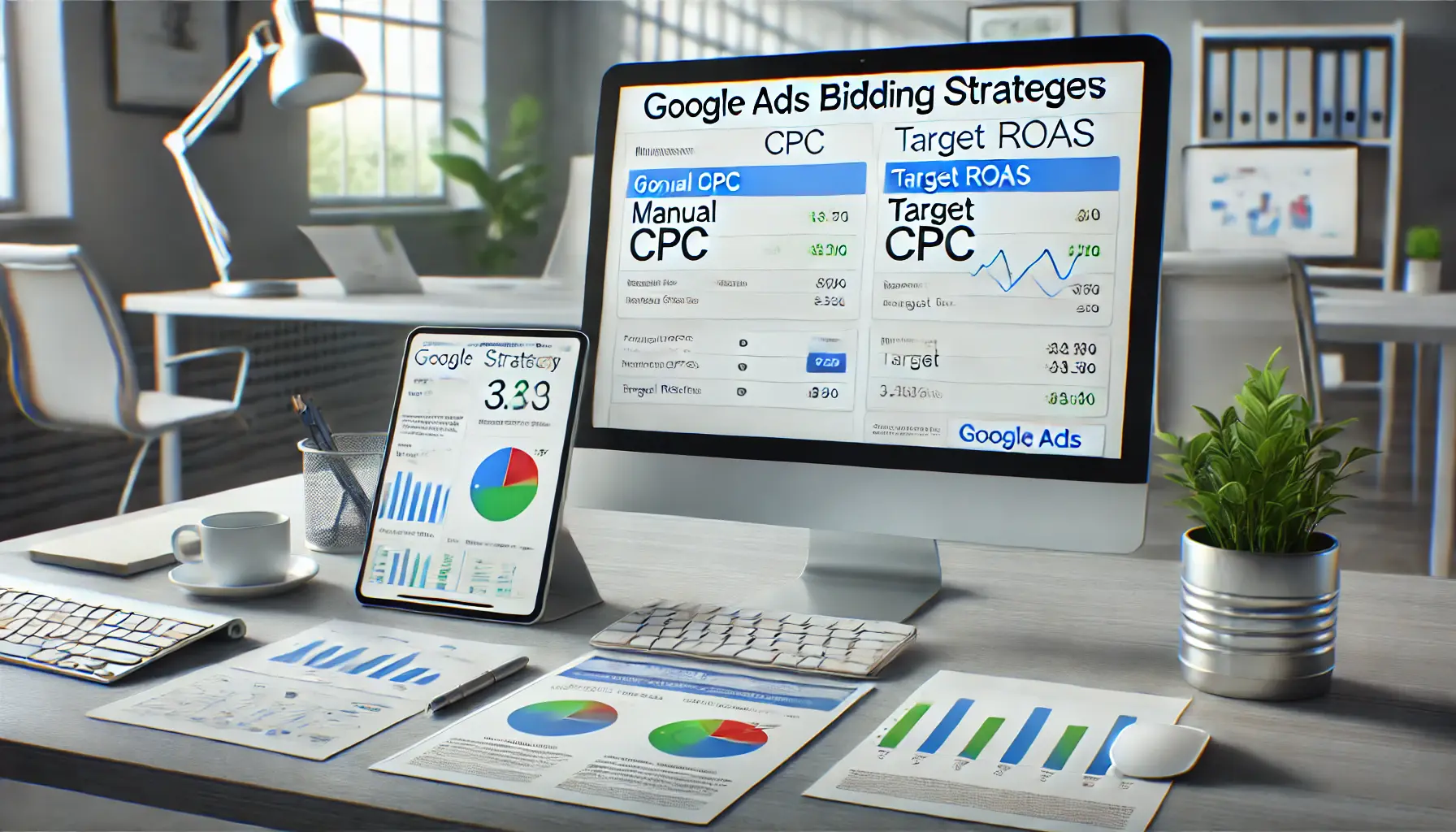
A representation of strategic approaches to optimizing Google Ads bidding strategies.
Implement Effective Bidding Strategies
Optimizing your bids is crucial for improving ROI.
Consider the following approaches:
- Smart Bidding: Utilize automated bidding strategies that use machine learning to optimize for conversions or conversion value in each auction. This approach can enhance efficiency and performance.
- Manual CPC Bidding: Maintain control over your maximum cost-per-click bids, allowing for precise budget management.
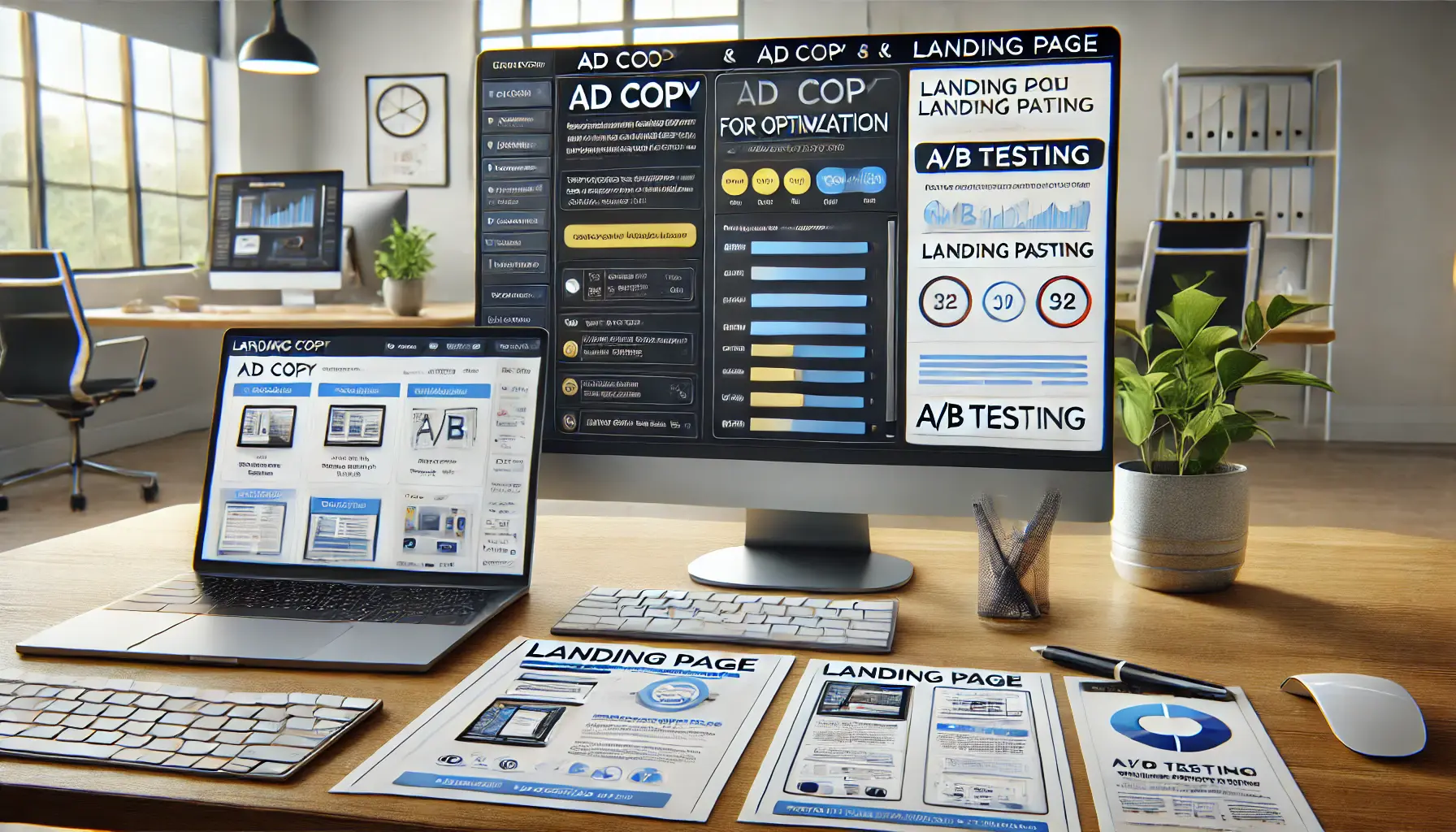
A representation of improving ad copy and landing page quality to enhance digital marketing performance.
Enhance Ad Copy and Landing Page Quality
Compelling ad copy and optimized landing pages are essential for high conversion rates.
Focus on:
- Ad Text Optimization: Continuously test and refine your ad copy to improve click-through rates and relevance.
- Landing Page Experience: Ensure your landing pages are user-friendly, load quickly, and provide valuable content that aligns with your ads.
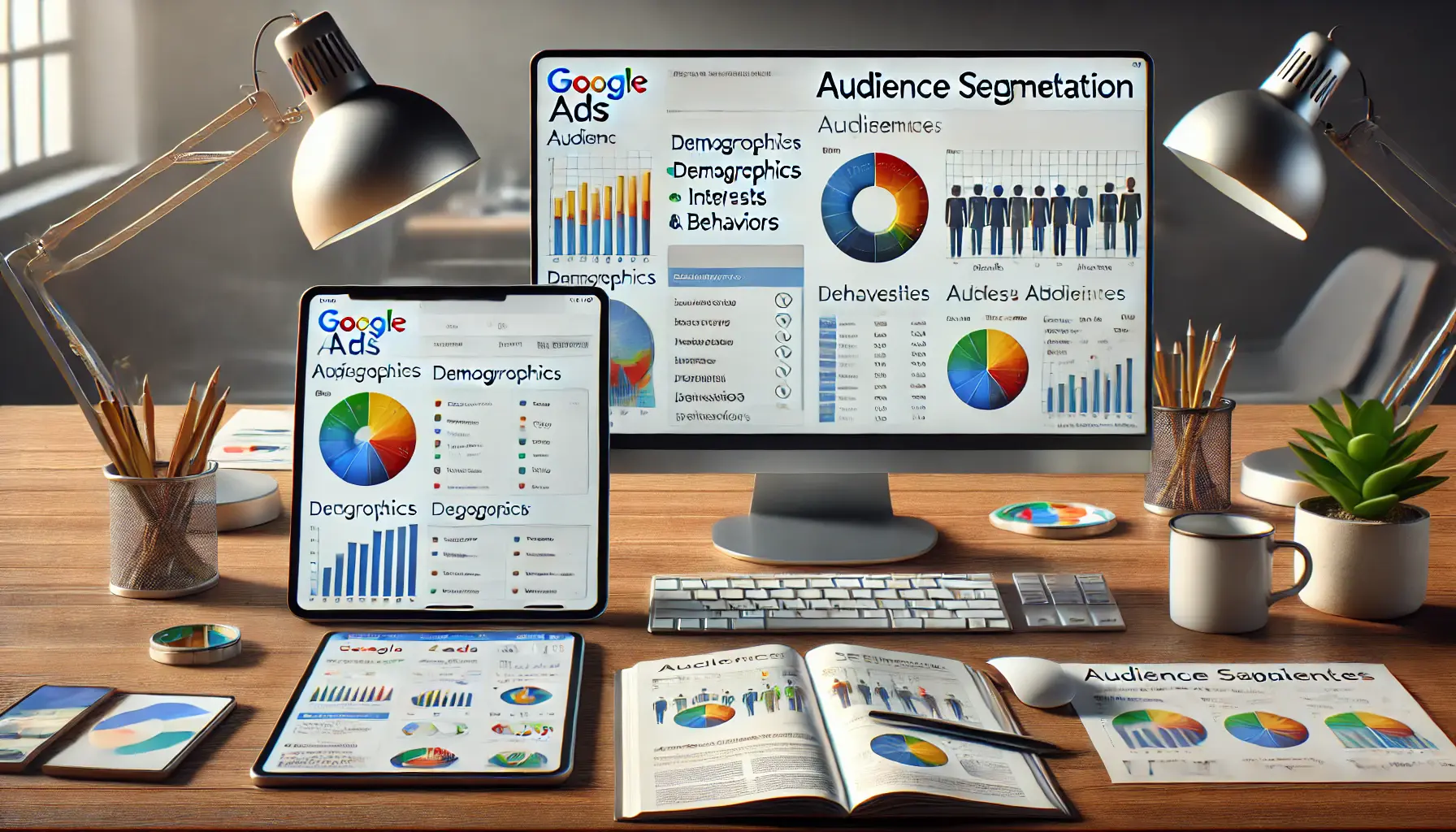
A depiction of precise targeting through audience segmentation in digital advertising.
Leverage Audience Segmentation
Targeting specific audience segments allows for more personalized and effective advertising.
Implement:
- In-Market Audiences: Reach users actively searching for products or services similar to yours.
- Remarketing: Re-engage users who have previously interacted with your website or ads.
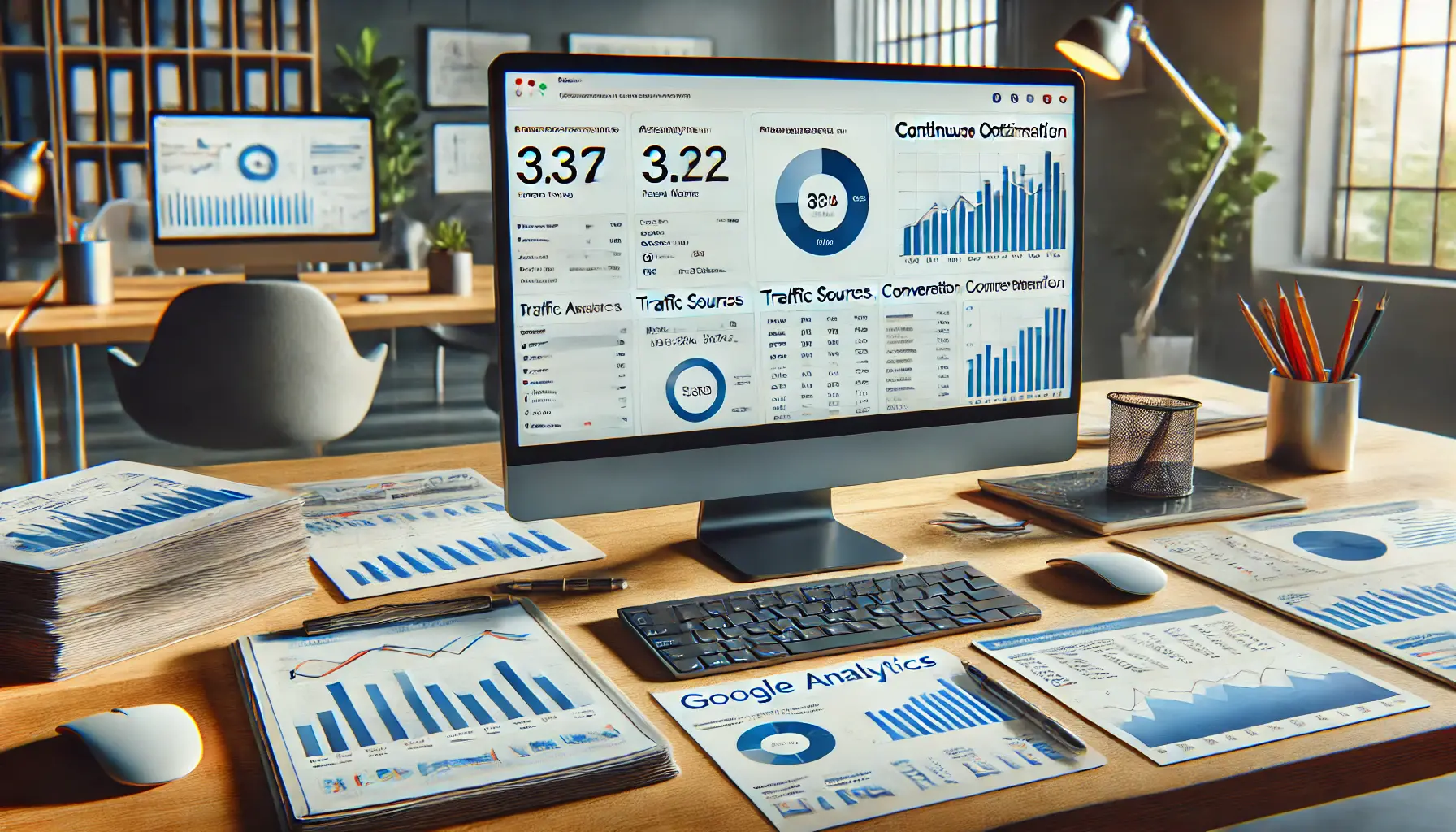
A depiction of leveraging data analytics for ongoing optimization in digital marketing.
Utilize Data Analytics for Continuous Optimization
Regular analysis of campaign performance data is vital for ongoing improvement.
Focus on:
- Conversion Tracking: Follow the actions of users who click your ads to assess their effectiveness.
- A/B Testing: Experiment with different ad elements to identify what works best with your target audience.
By following these strategies, you can get better performance out of your Google Ads campaigns and improve your return on investment.
- Implement smart bidding strategies for optimal results.
- Enhance ad copy and landing pages for better conversions.
- Use audience segmentation and data analytics for continuous improvement.
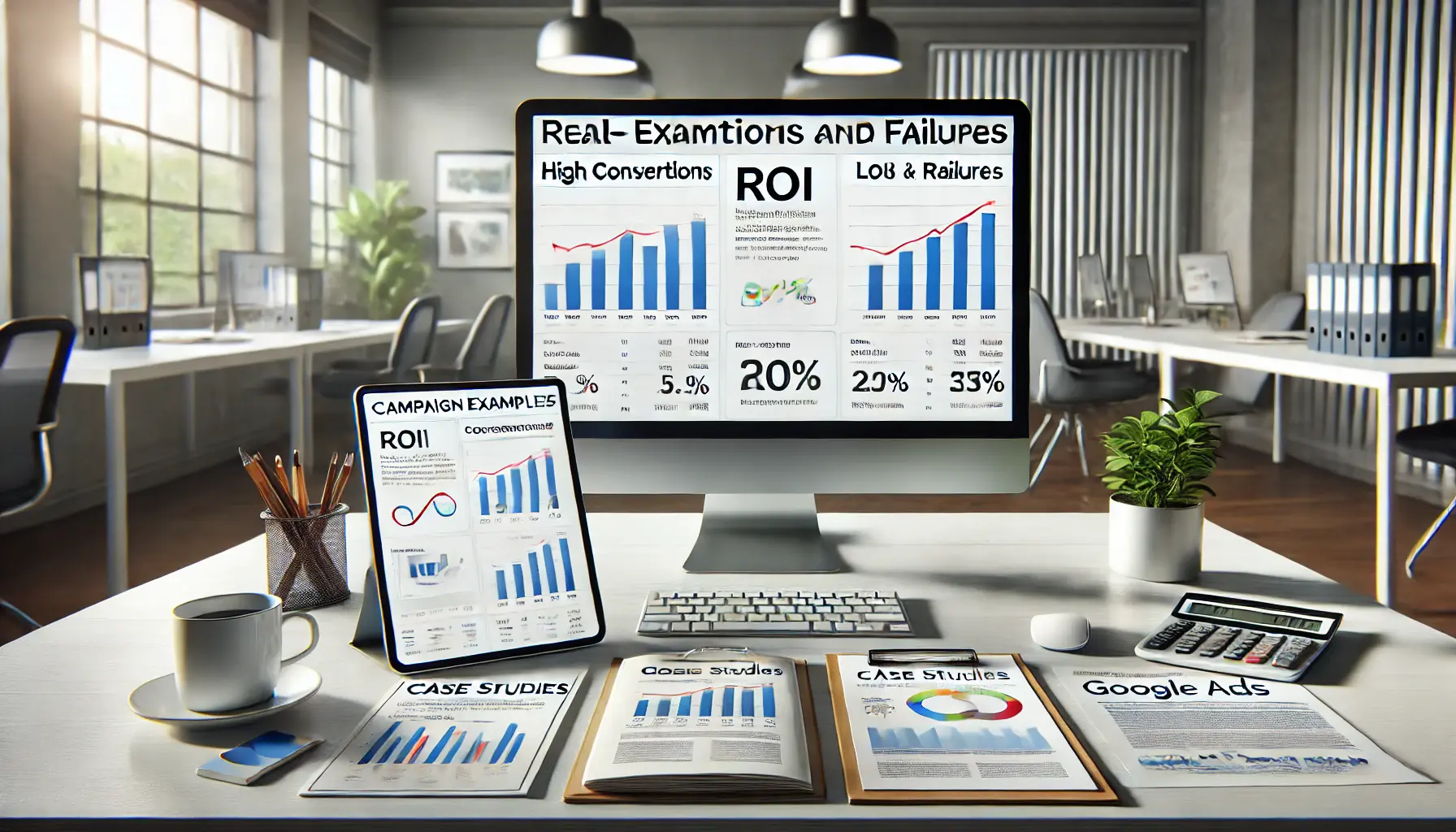
An illustration of analyzing successes and failures in Google Ads campaigns through real-world data.
Real-World Examples: Successes and Failures in Google Ads
Understanding the practical applications of Google Ads can provide valuable insights into its effectiveness.
Let’s explore some real-world examples that highlight both successes and challenges faced by businesses using Google Ads.
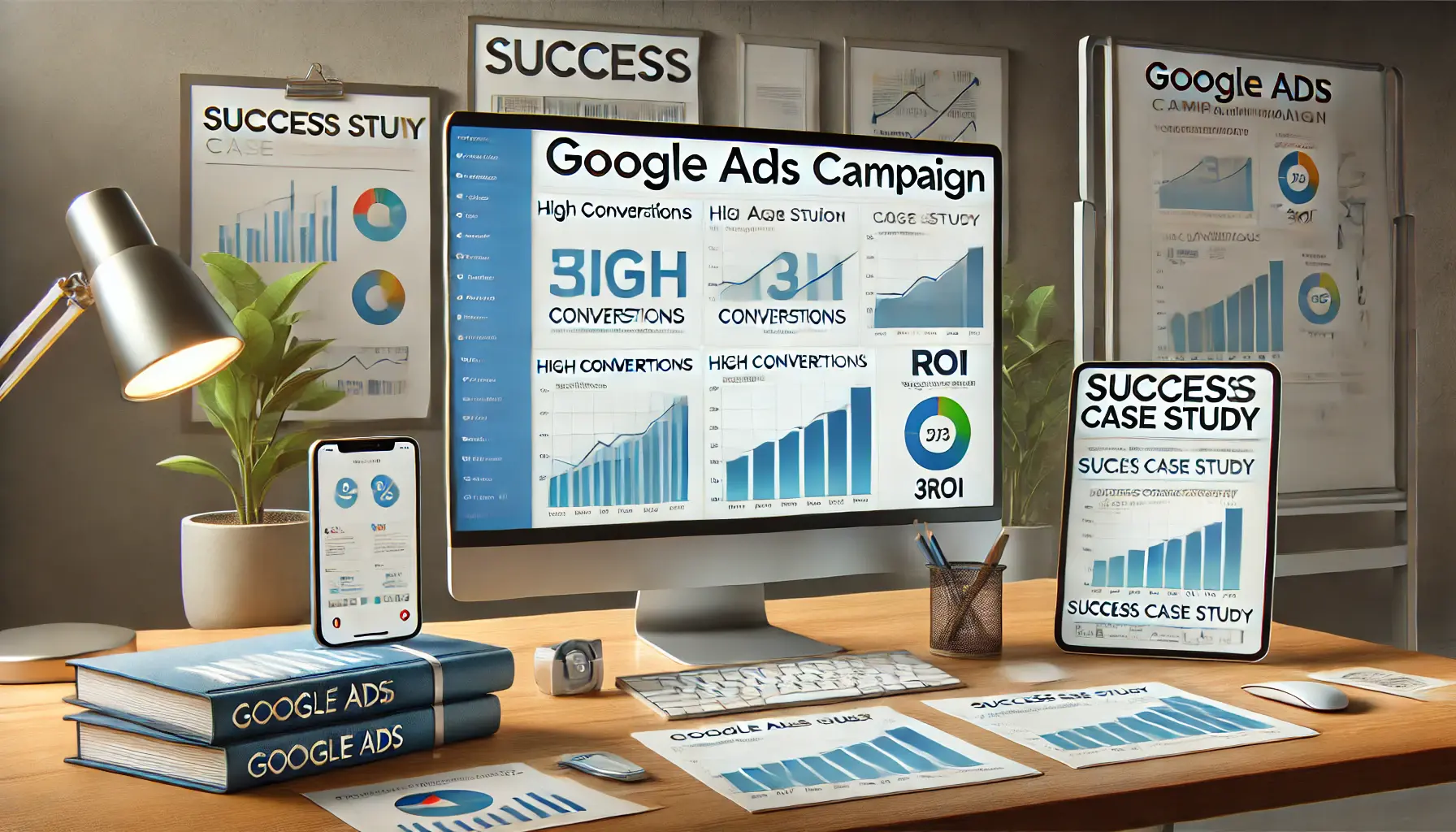
An illustration of achievements in Google Ads campaigns through successful case studies and metrics.
Success Stories
Many businesses have leveraged Google Ads to achieve significant growth.
Below are a few exemplary cases:
- Away Travel: Away Travel successfully exposed its brand to a wide audience by targeting unbranded search traffic, achieving an average click-through rate of 4.3%, far above industry benchmarks.
- Glossier: Glossier’s clear campaign structure with effective audience segmentation and targeted ads successfully reached its target market.
- ForRent.com: The implementation of Dynamic Search Ads led ForRent.com to a 26% increase in click-through rates and a 30% decrease in cost-per-click, significantly boosting online visibility and traffic.
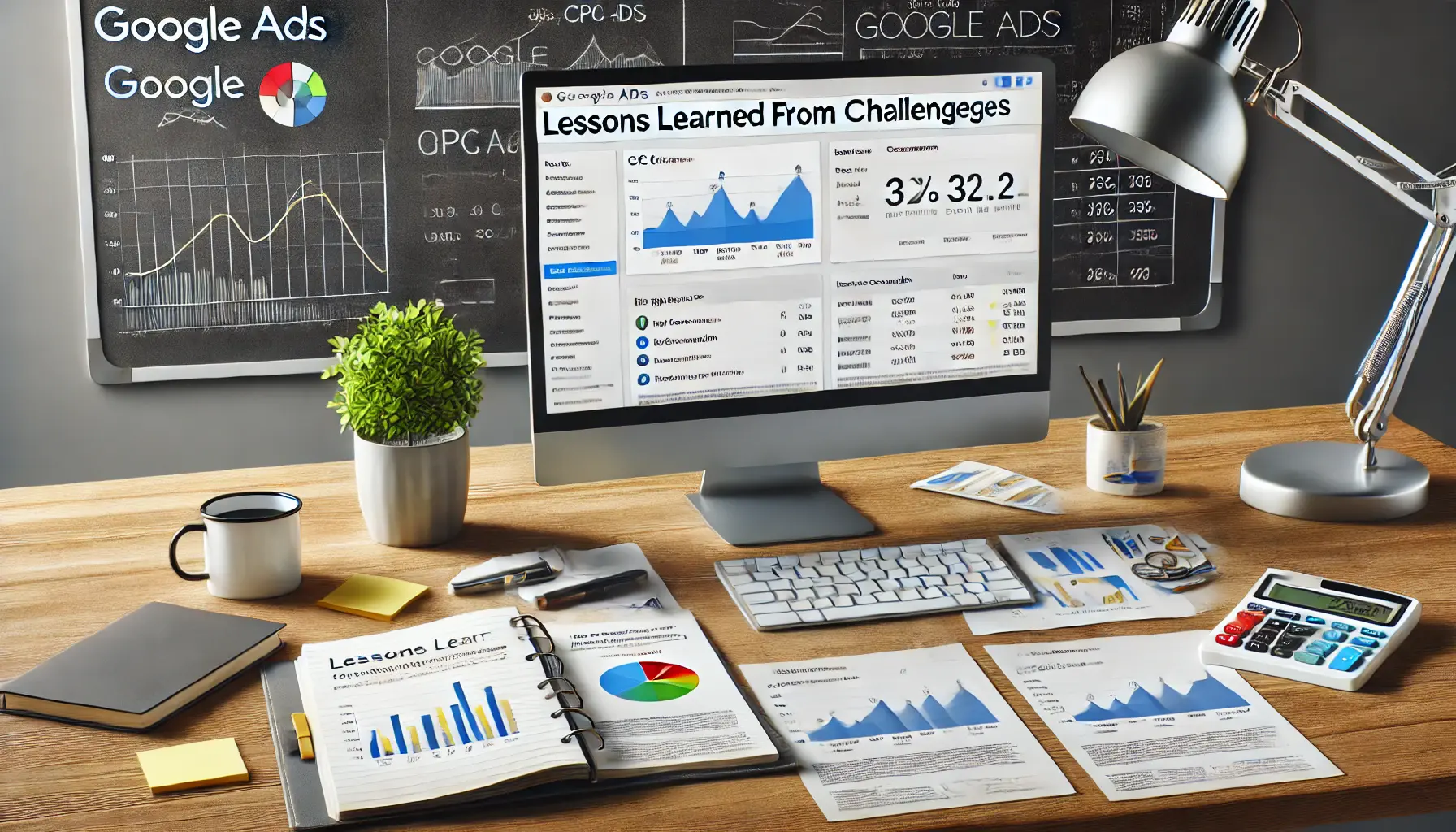
An illustration of learning from challenges in Google Ads campaigns through analysis and strategic adjustments.
Lessons from Challenges
Challenges can be as instructive as successes in their own way.
Here are some insights to consider:
- High Competition and Costs: Due to intense competition, the CPC rates were extremely high for a niche player in the health and beauty industry, resulting in unprofitable campaigns. This highlights the importance of thorough market analysis and strategic planning.
- Importance of Comprehensive Strategy: In one case study, focusing too much on keywords or ad copy without considering the big picture and having a high-level view of the overall lead generation strategy led to suboptimal results.
These examples demonstrate that while Google Ads can drive substantial growth, it’s crucial to approach campaigns with a well-researched and strategic plan.
Continual monitoring, analysis, and adaptation are essential to maximizing the benefits of your investment and ensuring long-term success.
- Success stories like Away Travel and Glossier demonstrate the potential of Google Ads when paired with effective strategies.
- Failures underline the importance of addressing competition and developing comprehensive plans.
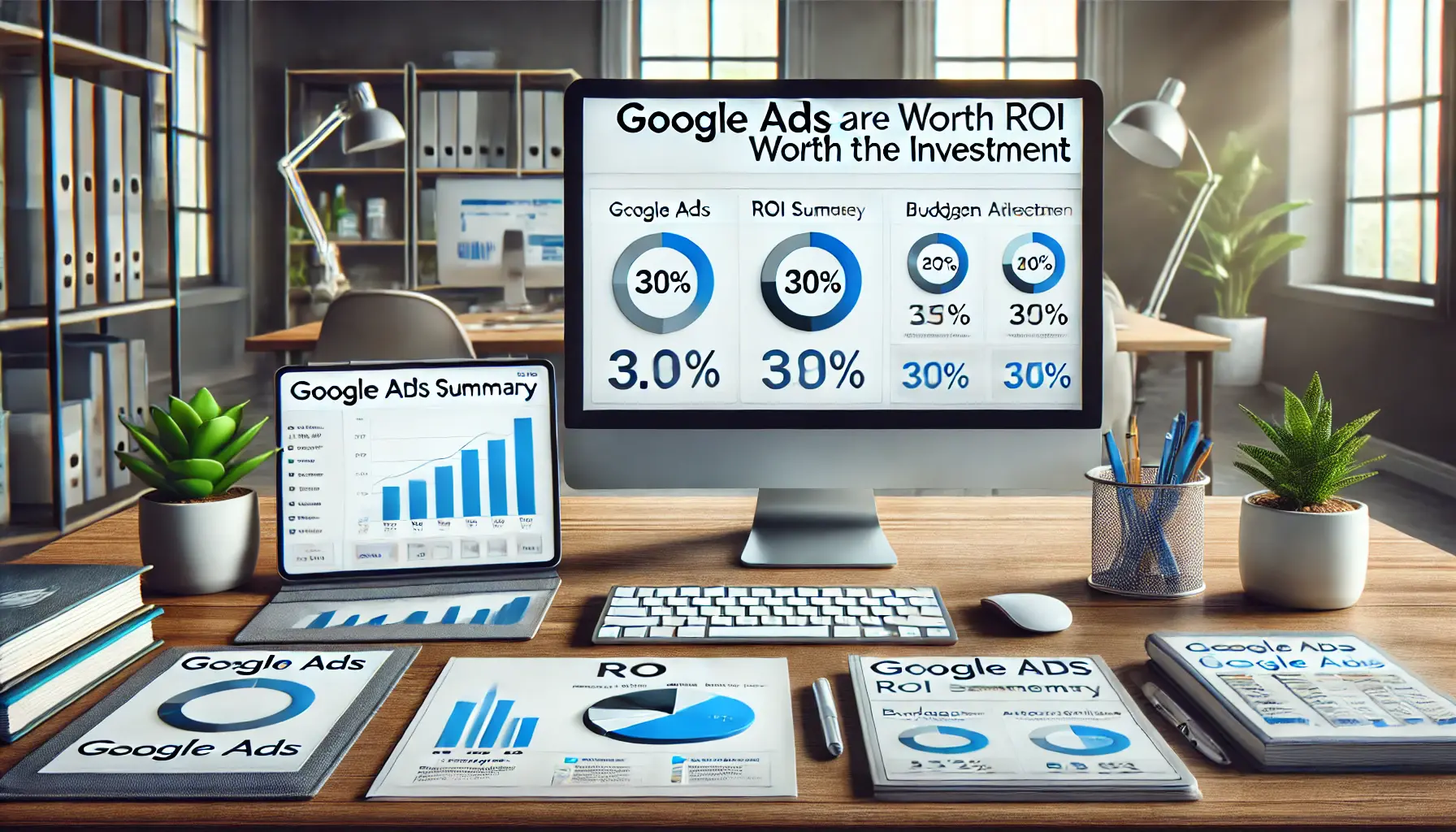
A depiction of concluding insights on the value of Google Ads investments through data analysis.
Conclusion: Are Google Ads Worth the Investment?
Google Ads has proven to be a dynamic platform that offers unparalleled opportunities for businesses to grow their online presence and drive measurable results.
However, making Google Ads worth the investment requires a strategic approach, careful planning, and continuous optimization.
Let’s summarize the key takeaways from this article:
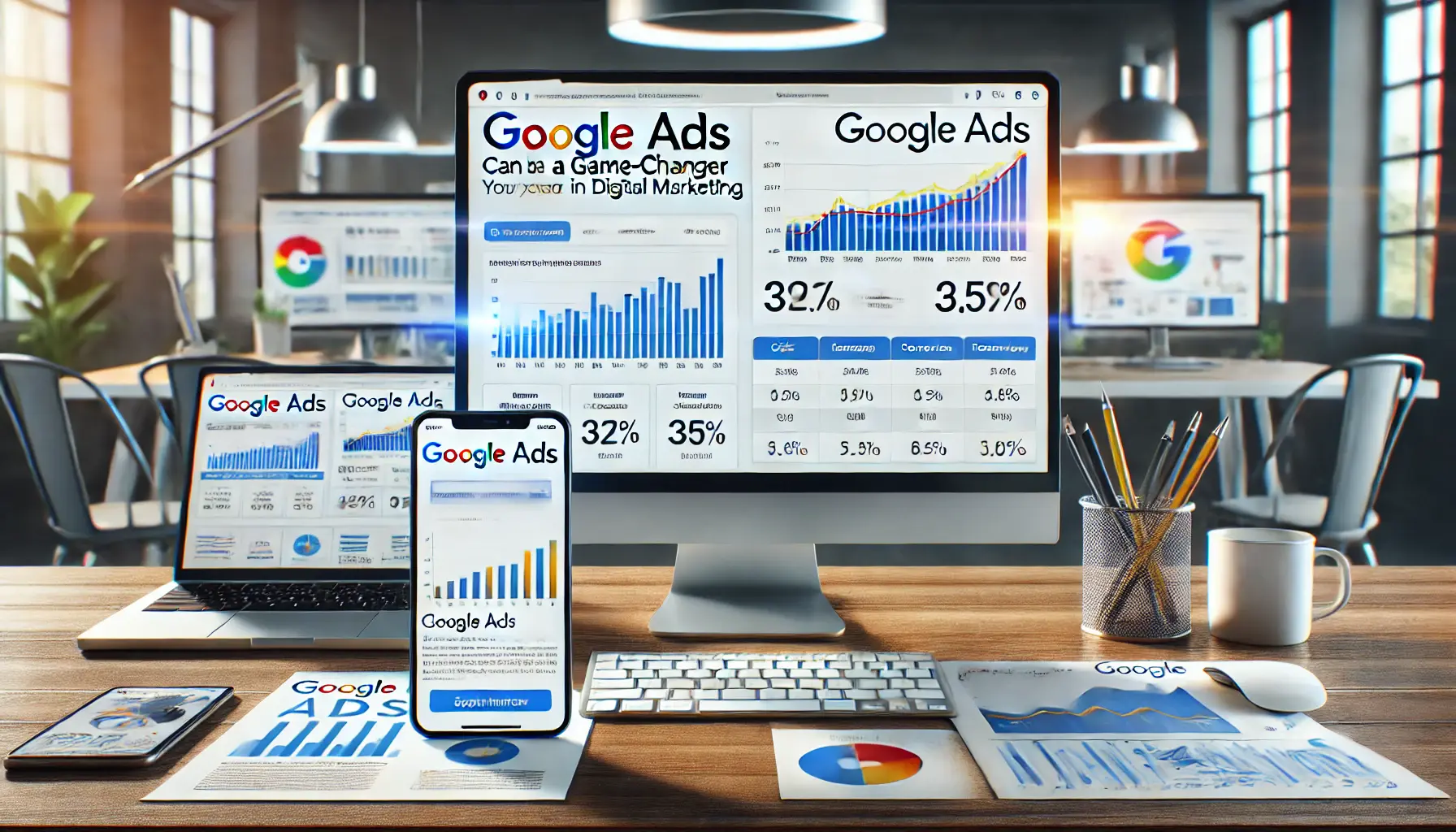
An illustration of the transformative impact of Google Ads in digital marketing through effective engagement.
Why Google Ads Can Be a Game-Changer
Google Ads allows businesses to connect with their audience through targeted advertising capabilities, robust analytics, and scalable budget options.
By focusing on key metrics like ROI, businesses can determine whether their campaigns are yielding profitable returns.
The platform’s flexibility makes it suitable for businesses of all sizes, from startups to large enterprises.
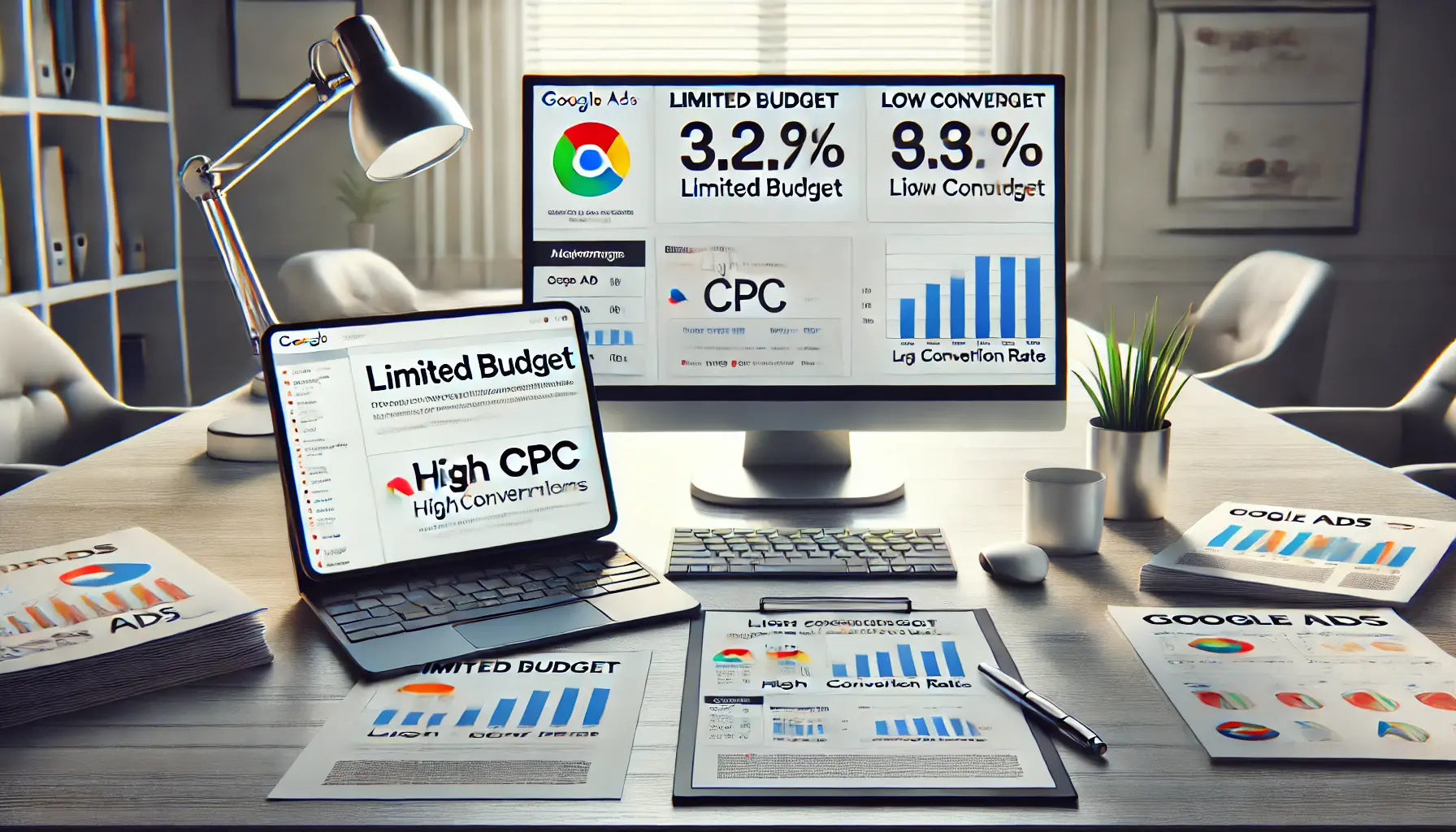
An illustration of key challenges in managing digital advertising campaigns, including budget and performance issues.
Challenges to Consider
Despite its benefits, Google Ads comes with its own set of challenges.
Rising competition can lead to higher costs, and non-compliance with advertising policies may result in ad disapprovals.
Additionally, achieving success requires effective keyword strategies and a deep understanding of your target audience.
Addressing these challenges is crucial to maximizing the platform’s potential.
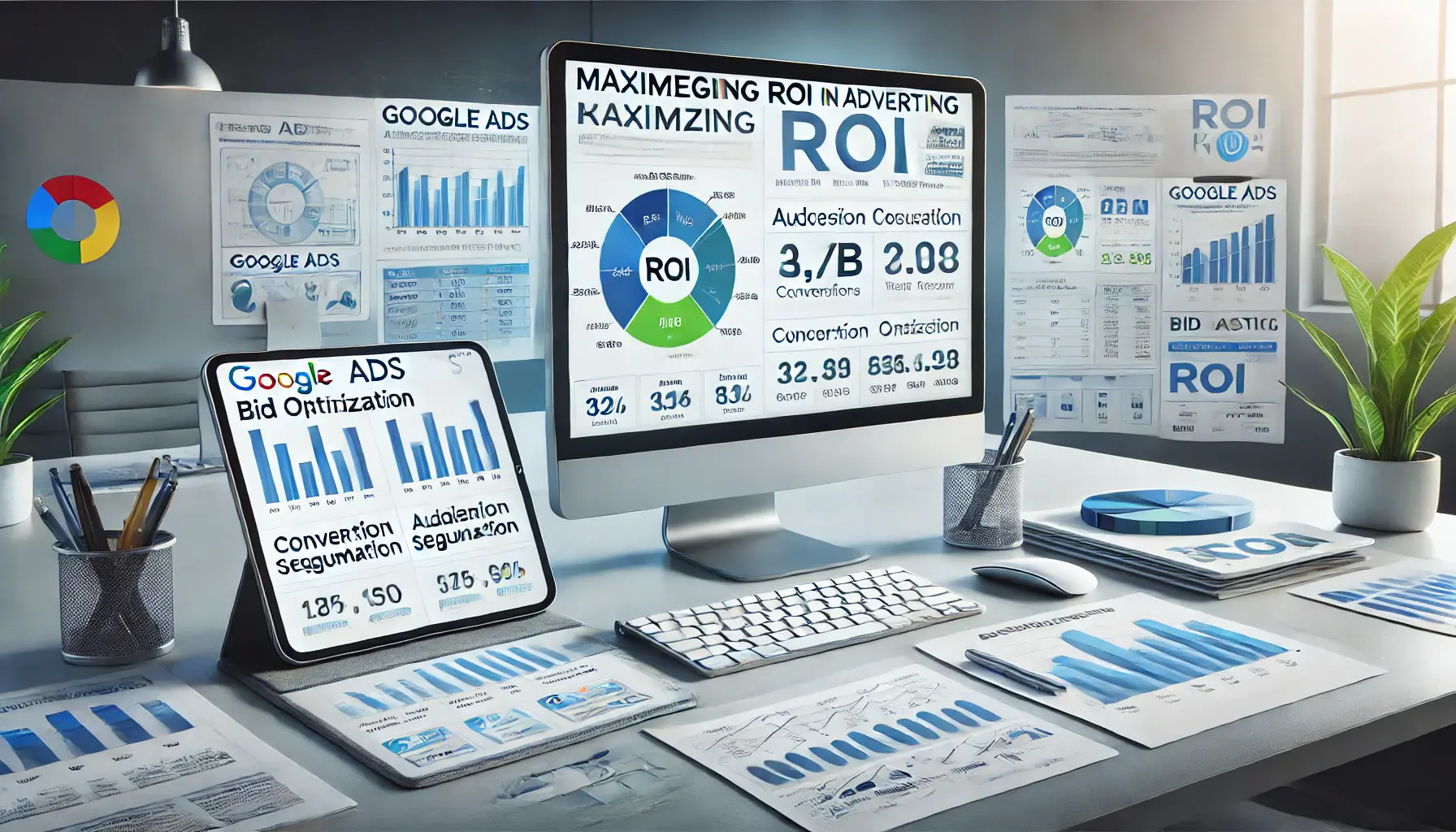
A depiction of strategic approaches to enhancing ROI in digital advertising through data analysis and optimization.
Strategies for Maximizing ROI
To ensure Google Ads campaigns are worth the investment, businesses should implement strategies like smart bidding, audience segmentation, and landing page optimization.
Leveraging analytics to track conversions and conduct A/B testing allows for continuous improvement and better decision-making.
Investing time and resources in these areas can significantly enhance campaign performance.
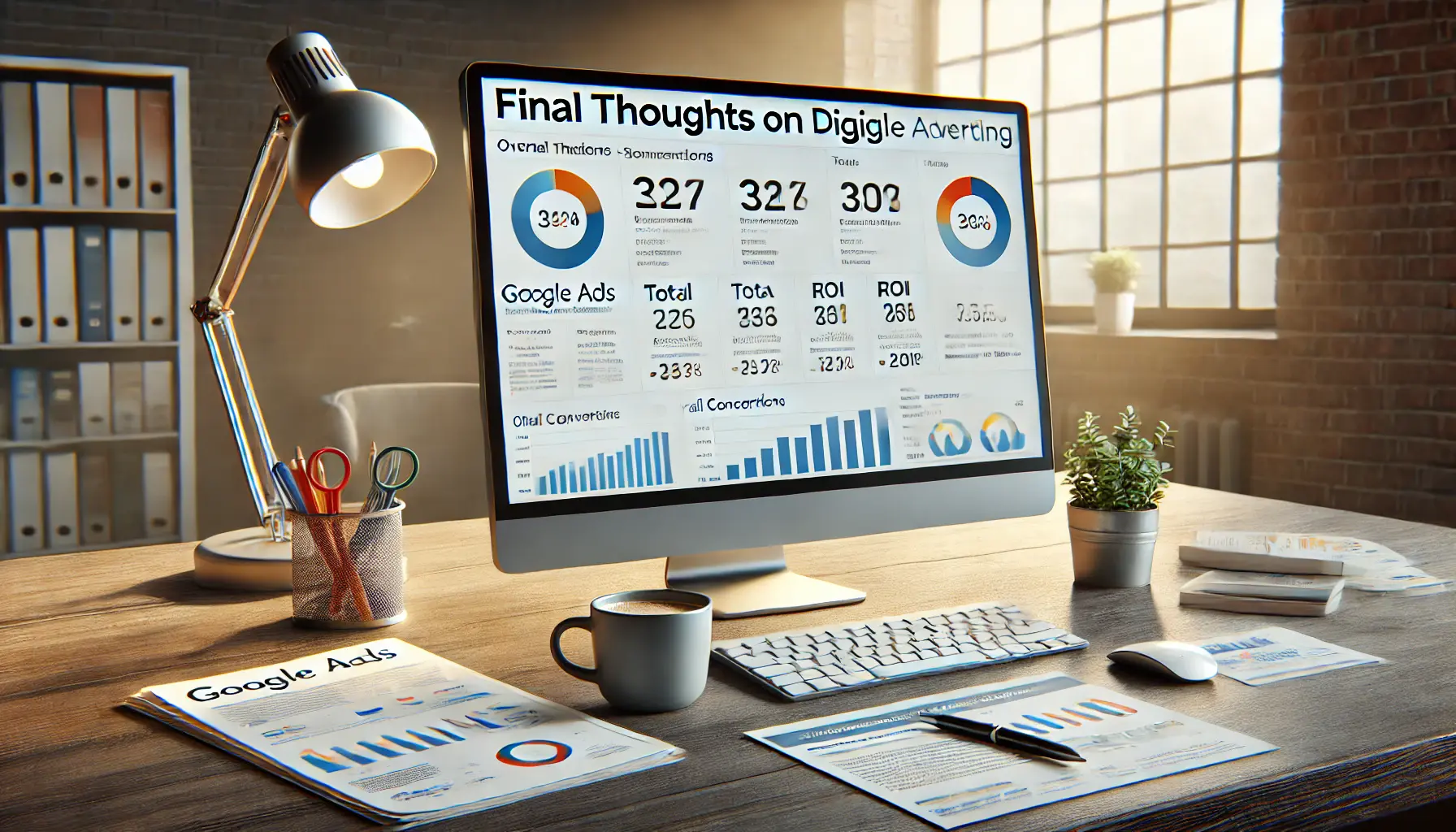
A depiction of strategic conclusions in digital advertising through campaign performance summaries.
Final Thoughts
So, are Google Ads worth it?
The answer depends on your approach.
With a well-researched plan, realistic expectations, and ongoing optimization, Google Ads can be a highly effective tool for driving growth and achieving your business goals.
However, long-term success cannot be taken for granted.
Staying attuned to changing market conditions and conducting continuous performance analysis are essential.
By overcoming challenges, applying strategies effectively, and concentrating on ROI, the true power of Google Ads can be unlocked, making it a cornerstone of your digital marketing efforts.
Google Ads can deliver exceptional results when campaigns are carefully planned, continuously optimized, and aligned with clear ROI goals. Addressing challenges proactively ensures long-term success.
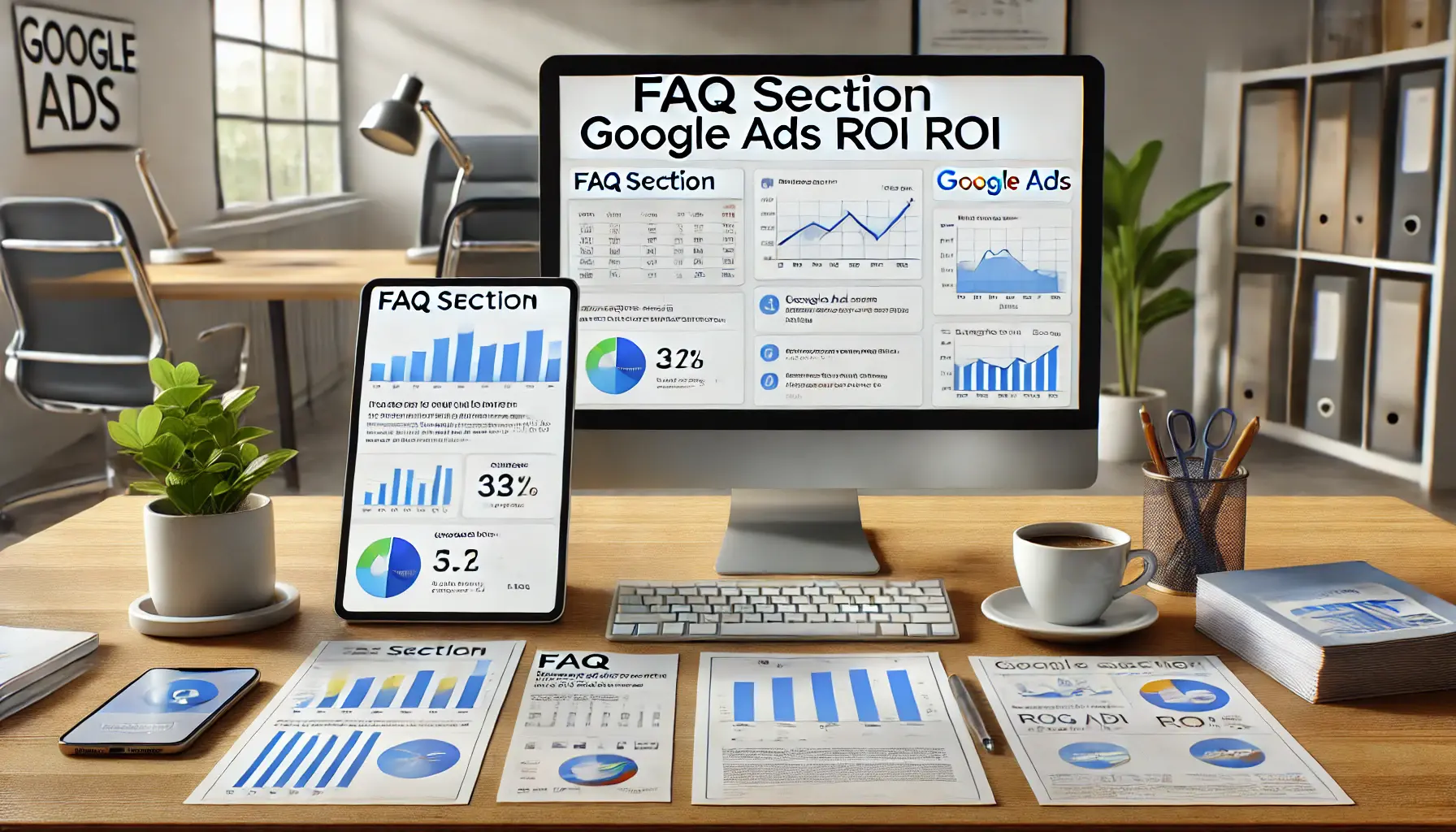
A depiction of a workspace addressing FAQs about Google Ads ROI through analytics and insights.
Your campaigns can be managed by an agency specialized in Google Ads, check out our service page.
Frequently Asked Questions about Google Ads ROI
Understanding Google Ads ROI is crucial for effective campaign management.
Here are some common questions and concise answers to guide you:
A good ROI varies by industry.
For example, in e-commerce, ROIs typically range from 200% to 300%, while in travel and hospitality, they can be as high as 600%.
Higher ROIs generally indicate more profitable campaigns.
Improve ROI through ad copy optimization, targeting relevant keywords, negative keyword usage, and landing page refinement.
Regular analysis and performance data adjustments are necessary to continually improve.
Key factors include ad relevance, keyword selection, bidding strategy, landing page quality, and competition within your industry.
Effective management of these elements can significantly impact your ROI.
ROI is calculated by subtracting the total cost from total revenue, dividing by the total cost, and multiplying by 100 to get a percentage.
This formula helps assess campaign profitability.
